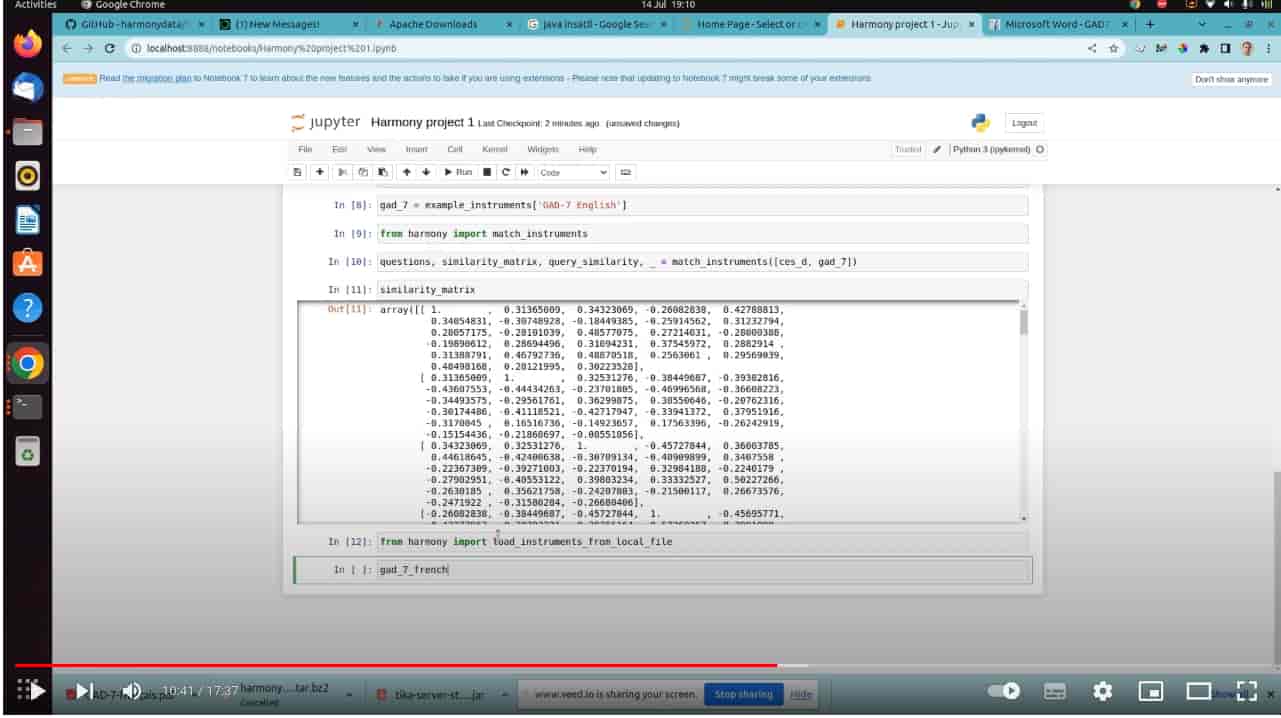Harmony is a tool using AI which allows you to compare items from questionnaires and identify similar content. You can try Harmony at https://harmonydata.ac.uk/app and you can read our blog at https://harmonydata.ac.uk/blog/.
Here you can find example scripts for using the Python and R libraries.
- Walkthrough R notebook in R Studio:
- Walkthrough R notebook in Google Colab:
View the PDF documentation of the R package on CRAN
- R Markdown to Check for Correspondence between Differently Worded Versions of the Same Scale Item View on Github - credit to Deanna Varley
- R Script to Check for Matches between Items from Different Scales View on Github - credit to Deanna Varley
- Walkthrough Python notebook in Google Colab with a single click:
- Example script to create a crosswalk table on real survey data
- Example script to strip prefixes from questions
Visit: https://harmonydata.ac.uk/app/
Harmony is based on four repositories: the core Python library, the API, the R port, and the front end for running in the browser. We welcome contributions and you can raise issues, pick up issues, and make pull requests.
- Python - the main core library and the Python package which is on Pypi
- R - the R port is on CRAN and it is slightly less mature than Python so we really appreciate if you can give the R package some TLC.
- API - the Python API runs with Pydantic and Fast API and is running on an on-prem server enabling the web app to work
- Web front end - we welcome feedback and contributions on front end and UX issues
- If you're doing research and found Harmony useful, please cite us!
- If you're a researcher trying to use the tool, and you encounter a problem, a bug, or a feature which you would like us to implement, please raise an issue on Github or message us on Discord.
Read our guide to contributing to Harmony here or read CONTRIBUTING.md.
You can contact Harmony team at https://harmonydata.ac.uk/, or Thomas Wood at https://fastdatascience.com/.
Harmony is a collaboration project between Ulster University, University College London, the Universidade Federal de Santa Maria, and Fast Data Science. Harmony has been funded by Wellcome as part of the Wellcome Data Prize in Mental Health and by Economic and Social Research Council (ESRC).
The core team at Harmony is made up of:
- Dr Bettina Moltrecht, PhD (UCL)
- Dr Eoin McElroy (University of Ulster)
- Dr George Ploubidis (UCL)
- Dr Mauricio Scopel Hoffmann (Universidade Federal de Santa Maria, Brazil)
- Thomas Wood (Fast Data Science)
MIT License. Copyright (c) 2023 Ulster University (https://www.ulster.ac.uk)
You can cite our validation paper:
McElroy, Wood, Bond, Mulvenna, Shevlin, Ploubidis, Scopel Hoffmann, Moltrecht, Using natural language processing to facilitate the harmonisation of mental health questionnaires: a validation study using real-world data. BMC Psychiatry 24, 530 (2024), https://doi.org/10.1186/s12888-024-05954-2
A BibTeX entry for LaTeX users is
@article{mcelroy2024using,
title={Using natural language processing to facilitate the harmonisation of mental health questionnaires: a validation study using real-world data},
author={McElroy, Eoin and Wood, Thomas and Bond, Raymond and Mulvenna, Maurice and Shevlin, Mark and Ploubidis, George B and Hoffmann, Mauricio Scopel and Moltrecht, Bettina},
journal={BMC psychiatry},
volume={24},
number={1},
pages={530},
year={2024},
publisher={Springer}
}




